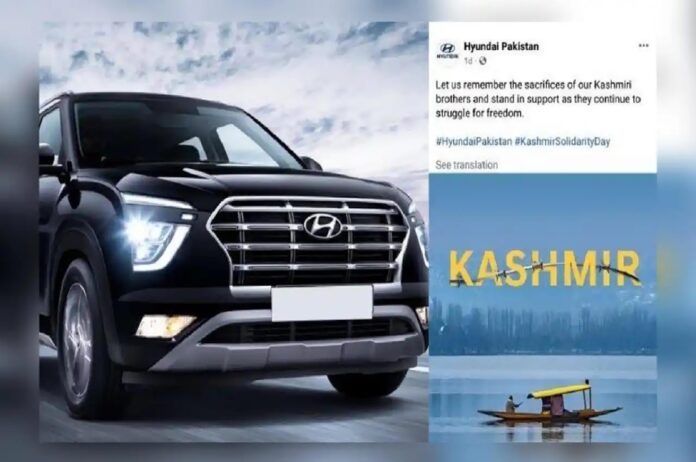It all started, as most chaotic things do in today’s world, with a facebook post. Early in the afternoon on the 5th of February the official Facebook page for Hyundai Pakistan put up a picture commemorating Kashmir Solidarity Day. It was the sort of page that a lot of company pages make to seem relevant and boost their social media presence and forget about without incident.
On most days, the post would have gone unnoticed. But the overlords of the internet had other plans. Somehow the facebook post reached a few Indian social media users and they were not amused. The users commented on the post, complaining that Huyndai, which is relatively new in Pakistan and has a massive presence in India, should not be allowing their local subsidiaries to be making what they claimed were politically insensitive social media posts.
At some point, someone took a screenshot of the post and put it up on Twitter. The post was quite tame. “Let us remember the sacrifices of our Kashmiri brothers and stand in support as they continue to struggle for freedom,” read the caption. Yet over the course of the next few days the post tempers ran high and the well-meaning post shook the highest echelons in the company’s international hierarchy and lit a fire that would spread and burn into a diplomatic nightmare and play a role in Hyundai taking a significant hit on the stock market.
What happened
Hyundai is a big company. The South Korean multinational corporation is one of the largest automobile companies in the world, operating in 6000 dealerships spread across 193 companies of the world with a capacity of producing 1.6 million vehicles a year and a labour force of 75,000 people.
Social media proved to be bigger. On Sunday the 6th of February, a day after Hyundai Pakistan posted the Kashmir Day commemoration, the post started to pick up some traction among Indian social media users, and within hours the hashtag “#BoycottHyundai began to trend. Within hours, unverified news reports ran on the Indian media claiming that 3000 bookings for Hyundai vehicles were cancelled in 12 hours.
To put that into perspective, India sold 505,000 Hyundai cars in 2021. In comparison, Hyundai sold a mere 8,000 models in Pakistan in 2021. The 3000 orders that were allegedly cancelled would have accounted for 40% of the total Hyundai sales in Pakistan last year. Normally, companies do have different social media presences in different countries and post in relation to local holidays and culture.
At this point, we do have to say that Hyundai making a post on Kashmir Day was not a big deal. It was something that a lot of companies do. Tuning in to local sentiments is a big part of tapping into a market, and in Pakistan not posting on the occasion of Kashmir Day might have been construed as anti-national. However, the force of the response from Indian social media users was harsh and resulted in a storm that no one could have anticipated and that got out of hand very quickly because of an overblown reaction. It says more about the nature of social media and the internet than it does about social media strategy or any sort of gaffe. Because this was not a gaffe on the part of Hyundai Pakistan – no – this was a phenomenon on the part of India social media. In this particular case, there was also a massive difference in the size of the markets and the Indians unhappy about the post realised that very quickly. The content in this publication is expensive to produce. But unlike other journalistic outfits, business publications have to cover the very organizations that directly give them advertisements. Hence, this large source of revenue, which is the lifeblood of other media houses, is severely compromised on account of Profit’s no-compromise policy when it comes to our reporting. No wonder, Profit has lost multiple ad deals, worth tens of millions of rupees, due to stories that held big businesses to account. Hence, for our work to continue unfettered, it must be supported by discerning readers who know the value of quality business journalism, not just for the economy but for the society as a whole.To read the full article, subscribe and support independent business journalism in Pakistan


























its amazing love it well written very informative
Kashmir is independent state, Hyundai take decision he has freedom to post for Kashmir, Indian social media should not make hashtag against Hyundai
types of pitched roof
caisson foundation